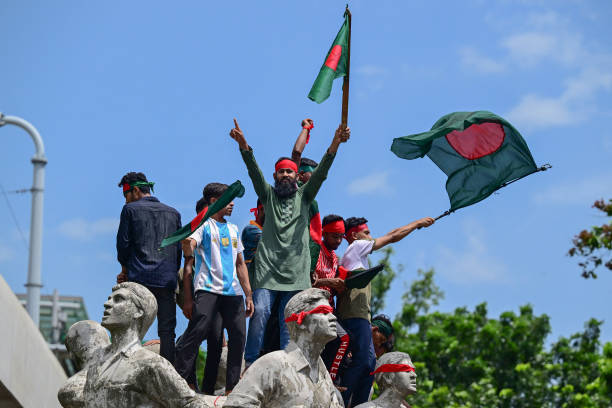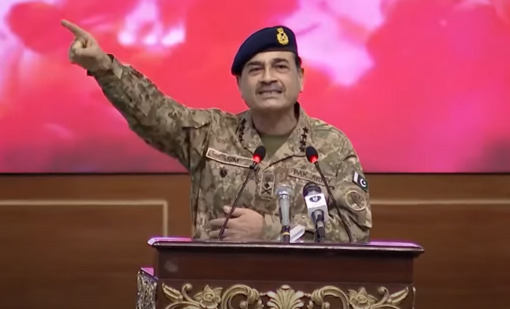India’s interests lie in the success of Bangladesh and its people, not any one particular political party. The presence of ousted Prime Minister Hasina in India is unlikely to lead to any misunderstanding as it was the army that brought her there. New Delhi will have to put to rest any Dhaka’s concerns of her continued political role from there.
by Prasad Nallapati
A new political landscape is now in place in Bangladesh after weeks of tumultuous events that led to death of over 400 people.
The Army remained in the background sensing the uncompromising mood of student protesters, but took effective control of political situation. Prime Minister Sheikh Hasina was quickly eased out of the country and brought in an interim government led by her bete noire and Nobel laureate, Muhammad Yunus, as demanded by protesters.
A 17-member Advisory Council, led by Dr. Yunus, includes his own proteges, protest movement leaders including student coordinator and professors, administrators and human rights activists.
They have their task cut out to restore order and democracy amidst continuing violence against public property and Hindu minorities, and revive economy. The `Anti-Discrimination Student movement’ has its roots in growing unemployment and stagnant economy.
What Lies Ahead
Dr Yunus, though more an economist, has had strong political ambitions that have unequivocal support from Western countries. President Obama made a relentless campaign for Nobel Peace Prize for him which was awarded in 2005.
The interim government set up by the Army in 2007, after ousting the then government of Khaleda Zia of the Bangladesh National Party (BNP), had toyed with the idea of `Minus Two” rule to get rid of both `Begums’, Khaleda and Hasina.
He was therefore `hunted and hounded’ by Hasina regime to malign his reputation with charges of financial embezzlement. This partly explains the US campaign to undermine her government since 2009 when she had returned to power riding popular upsurge.
Whether Dr Yunus now wants to create a third `force’ or a political party, with the backing of the army and western countries, is to be seen.
The `interim government’ may last for a year or two before fresh elections could take place, despite demands for early polls. The last such interim set-up in 2007, headed by Fakhruddin Ahmed, had lasted for two years before elections could take place.
Hasina’s Awami League (AL) may now be out of power but remains a potent force with strong country-wide network. Khaleda Zia and her BNP are much weakened but together with their ultra right wing ally, the Jamaat-e-Islami (JeI), may fast regain their strength. The latter’s student wing, Islami Chhatra Shibir, infiltrated the recent protests turning them more violent.
Much of the leadership of the pro-Pakistan BNP and JeI has been incarcerated or executed during the 15-year Awami rule for their role in killing the founder of Bangladesh and father of Hasina, Sheikh Mujibur Rahman, along with other party leaders, and launching attacks on Hasina herself.
They are all expected to be released who in turn might unleash a new wave of terror and jihadi violence to promote their interests.
Implications for India
The removal of the Hasina government is a serious set back for India. The last 15 years of her rule can be considered a golden period for India-Bangladesh relations. Pakistan-sponsored anti-India jihadi forces were suppressed and India’s insurgent groups, which were operating freely from Bangladesh, were rooted out and their leaders turned over to India.
Economic cooperation between the two countries reached new heights thanks to stable relations. Most of the Bangladeshi exports into India were given concessional or zero percent of customs duties. Power generation and sharing agreements helped Bangladesh to avoid shortages.
Under the BIMSTEC multilateral initiative and India’s own `Act East’ policy, Bangladesh is set to play the pivot for a number of connectivity projects between India and the Southeast Asian countries. Operationalization of Chittagong and Mongla ports for easy connectivity to India’s northeastern states served mutual interests.
A non-cooperative regime in Dhaka could spoil all that has been painstakingly built over these 15 years.
Dr Yunus is not inimical to India, though its association with Hasina’s regime may leave some bitterness. He is a realist and remains focused on quick economic revival to create jobs to millions of restless youth that brought him to power.
While the western countries may come to his aid, he may also be courted by China through offers of liberal financial aid. The interim government may not be as sensitive as that of the Hasina’s regime to India’s security concerns relating to China’s offer of investments in strategic sectors.
Politically, the new lease of life given to BNP and JeI elements is expected increase the influence of Pakistan’s military and jihadi establishments in Bangladesh.
Way Forward
All is not lost on India, though.
The interim government has no political representatives that are inimical to India, signaling its neutral composition. The current generation of military personnel appear to be more liberal and devoid of any religious conservatism like their predecessors who were trained in Pakistan’s military academies.
Neither of the institutions is likely to allow any Pakistani designs to wreck their country’s march towards liberalism and economic progress.
India’s interests lie in the success of Bangladesh and its people, not any one particular political party. The presence of ousted Prime Minister Hasina in India is unlikely to lead to any misunderstanding as it was the army that brought her there. New Delhi will have to put to rest any Dhaka’s concerns of her continued political role from there.
India’s overtures are likely to be reciprocated in equal measure. Dhaka may be offered all possible assistance to help the new political dispensation to settle down. Containing the violence, particularly against the minorities, is the priority as that could cause immense pressure on India in the form mass migrations.
Sheikh Hasina’s presence in India is an opportunity to impress upon her to encourage new leadership of the Awami League. She cannot shun her responsibility for the current state of affairs in the country. The party has become rudderless following her sudden departure and its cadres are facing brutal attacks from JeI and other jihadi elements.
A new party leadership can quickly work with the government to put an end to such violence and get its cadres reorganized. As the BNP and JeI are already preparing for elections, the AL cannot be seen lagging behind. The AL, under an effective leadership, can still turn around its fortunes.
(*Prasad Nallapati is President of the Hyderabad-based think-tank, Deccan Council for Strategic Studies, and former Additional Secretary to Govt of India)




